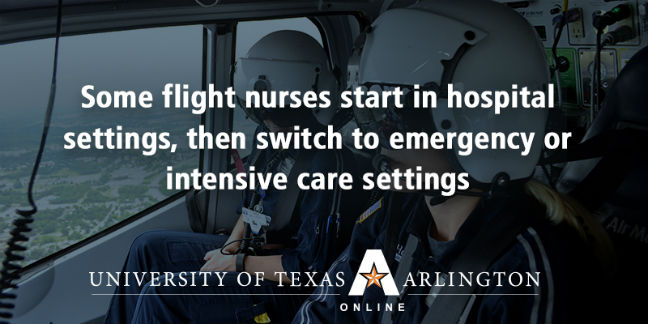
The online Bachelor of Science in Nursing (BSN) program from The University of Texas at Arlington (UTA) prepares students to work in a variety of nurse roles and settings. When we think of nurses, we often think of clinics, hospital floors, emergency rooms and rehab centers, but many other settings also require nurses with specialized expertise. One type of nurse who works in a more unique environment is the flight nurse.
Definition of a Flight Nurse
A flight nurse, as the title implies, takes to the skies in a helicopter or other aircraft along with a pilot and often a paramedic. These nurses work with the team to respond to calls. Some calls involve trauma, such as car accidents, while others are less dramatic, such as transfers between hospitals. This specialized type of nurse typically works for a hospital, trauma center, fire department, search and rescue organization or the military.
Job Responsibilities in the Air
Flight nurses provide care for patients who range in age from birth to the final stages of life. They assess patients, administer medications and use equipment to stabilize patients during medical crises. Many of the patients they help are dealing with life-threatening trauma, so this is a type of intensive care nursing.
In addition to these nursing activities, flight nurses also reassure patients who are afraid and traumatized. They must also have a basic understanding of flight and navigation. Flight nurses must do all this calmly and without supervision, given the extremely small team in a helicopter.
Typical Flight Nurse Calls
Although each day on the job and each call is different, there are some typical scenarios that flight nurses face. Here are a few examples:
- Auto accident: Flight nurses join the response to auto accidents. These patients are typically badly injured, and the nurse must address the patient’s injuries on the way to the local trauma hospital.
- Cardiac issues: A patient may have a cardiac issue that a local hospital cannot adequately address. The flight nurse treats the patient while transferring them to a larger regional medical center that specializes in complex cardiac conditions.
- Hospital transfer: The flight nurse helps transfer the patient to a larger hospital in a nearby city that is properly equipped to address the patient’s health issues.
Necessary Traits for a Flight Nurse
Because of the uniqueness of the flight nurse’s position, certain traits are necessary. These include the following:
- Calm: These specialized nurses need a calm demeanor so they can make rational decisions. At the same time, because the job is so intense, they need to be able to thrive in a high-adrenaline environment.
- Independent: Working with such a small team, the flight nurse needs to be able to think and respond independently and confidently. This type of nurse also needs to enjoy the freedom that comes with this level of autonomy.
- Communication skills: Time is of the essence when dealing with these situations, and it is essential that flight nurses communicate well with other members of the flight team.
- Improvisation: Because each call is different, a flight nurse needs to be able to take scenarios as they come and accept the unpredictable nature of the job.
- Quick thinking: Being able to think and act quickly can often make a critical difference in the lives and health of patients.
- Compassion: Nurses in all settings need to be compassionate, but flight nurses often deal with patients who are badly injured or facing life-threatening medical crises.
Becoming a Flight Nurse
The path to becoming a flight nurse is a little different than other types of nursing positions. Many organizations that hire flight nurses — the U.S. Air Force, for example — require a BSN as the minimum level of nursing education. Some flight nurse positions may require a graduate-level degree in emergency nursing.
Flight nurses may start out as nurses in hospital settings then work in emergency or intensive care settings. Those who advance to becoming flight nurses may earn Certified Flight Registered Nurse (CFRN) certification through the Board of Certification for Emergency Nursing (BCEN), along with other emergency certifications.
The flight nurse fulfills an essential niche within the nursing profession. The job can be both rewarding and challenging. Flight nurses work in unique, constantly changing settings, doing a heroic job for their communities and beyond.
Learn about UTA’s online BSN program.